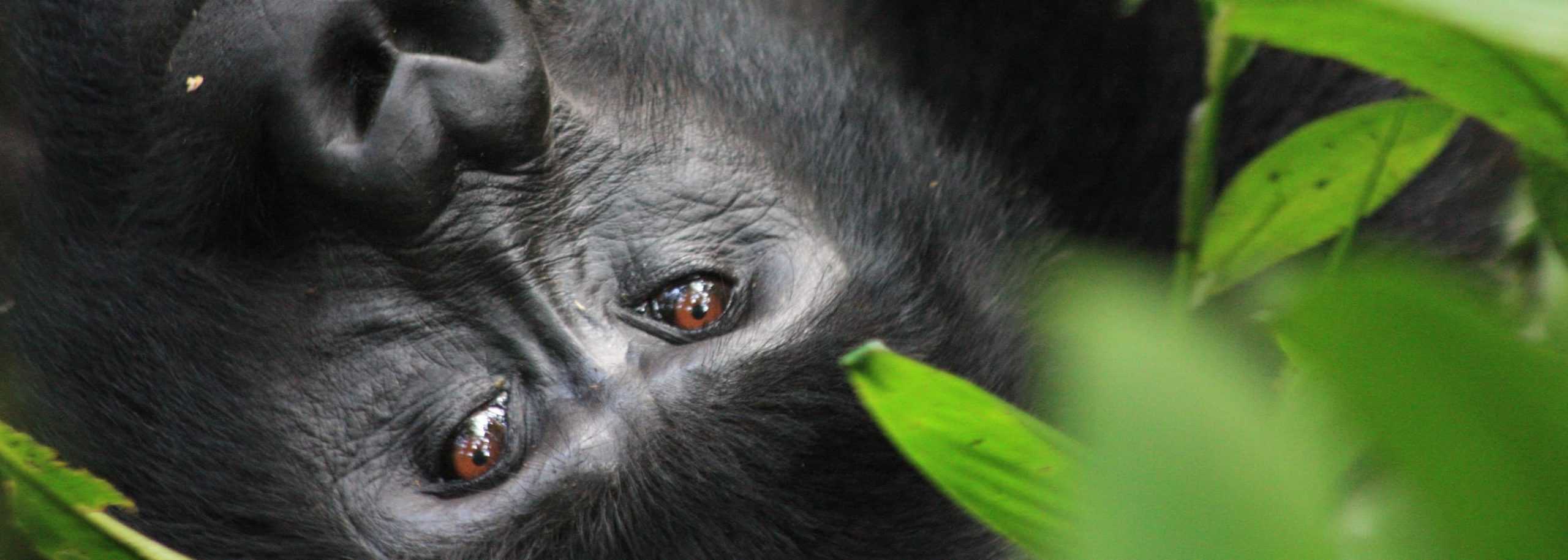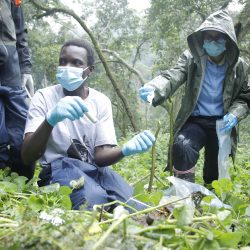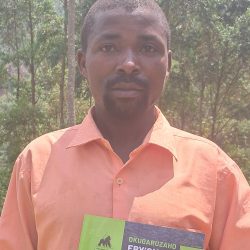Coping with the Impact of COVID -19; A Case of Uganda’s Park Edge Communities.
Blog | 23/06/20
How do we go on from here, what’s the future like for us in the event that COVID -19 is most likely here to stay? This seems to be the question everyone is asking themselves especially the park edge communities whose lives largely depended on tourism. Previous reports from the communities and park authorities indicated that several people in and around the park including porters, tour guides, local artisans, casual laborers had been hit hard by the suspension of tourism and the lock down of most economic activities following the outbreak of COVID-19 in the region.

A woman displays her beautifully woven basket. Photo by Change a Life Bwindi.
Many households were and are still struggling to make ends meet including raising a day’s meal for their families let alone afford a bar of soap to keep their hands clean and sanitized regularly as a preventive measure against COVID-19.
“Everybody is constantly being destroyed and rebuilding themselves, some more drastically than others” says Michael Shannon, an American celebrity. It’s therefore not enough to keep whining about how much COVID-19 has destroyed but rather an opportunity to reflect, re-strategize and start rebuilding ourselves, livelihoods and the economy.
IGCP spoke to some of its partner Community Based Organizations operating in the park edge communities in the Bwindi Mgahinga Conservation Area to understand the coping mechanisms they have adopted to help their members and communities at large through this challenging period and the recovery plans they have post COVID-19. Several organizations noted that they are distributing relief food and sanitation/hygiene supplies to their members and some members of the community. In addition to this, community members are being encouraged to farm annual crops to raise sufficient food supply for their households in the meantime.
Christina Katushabe, Project Director and Sustainable Manager for Change a Life Bwindi – https://www.changealifebwindi.org/ , a Community Based Oorganization (CBO) aimed at uplifting the well being of the communities in Bwindi through creation of sustainable livelihoods opportunities like fashion, weaving and basketry, bee keeping and empowerment of the vulnerable batwa people shares that at the onset of COVID-19 in Uganda, the organization set up a fundraiser on social media to support the affected communities and as of June 2020 they had raised about 1900 USD. “This money enabled us to buy relief food and sanitation supplies including rice, maize flour, beans and soap for the members”. Christina adds that the organization is also giving members vegetable seedlings to plant in their kitchen gardens to provide food and also some income for those who will choose to sell.

Relief supplies ready for distribution. Photo by Change a life Bwindi.
Commenting on how the 100 members of her organization are keeping themselves busy during this lock down, Christina says, luckily enough for her members they had just purchased new stock of raw materials for their weaving and fashion enterprises, so most of the members are working from their homes and stocking products for sale when the situation normalizes. Bee keepers on the other hand continue to harvest and stock their honey for sale when the lock down is lifted.
Sharing the organization’s post COVID-19 recovery plans, Christina Katushabe says she is going to train all the members how to make soap. According to Christina soap is not only an essential household item but it has the potential to bring in income if done on a ‘large’ scale. “We have noticed that most homes lack and or cannot afford soap and yet it is clearly going to be a much-needed item in the prevention against COVID-19. The training should be able to address this challenge” Christina notes.
Apparently, the immediate need for most grass root households is food and soap and then a source of income in the long run. Boosting food security, diversifying income generation sources and improving individual saving practices should be some of the key long-term strategies to explore.
It is interesting how Buhoma Mukono Community Development Association – www.buhomacommunity.com (BMCDA) plans to handle related future calamities. Richard Ngabirano, Chairperson for BCMDA says “Having realized that food is the biggest challenge in our community, we are planning to establish a food bank”. Richard explains that seeds will be distributed to community members and upon harvest each farmer shall give back 10 Kilograms of their harvest to the bank. The stocked food will serve two purposes – provide seeds for planting to new farmers (those who didn’t receive in the last season) and also as security in case of calamity. “This will be our fall-back plan” Richard adds. BMCDA is currently writing proposals to secure funding for this promising initiative. Just like other organizations, BMCDA has distributed food and soap to its members and other members of the community.

Gitenderi Protect Environment group on the other hand, has relaxed the borrowing terms for its members. Members of its Savings and Credit Cooperative Organizations (SACCO) that requested for quick loans to buy food for their families and transport to pick their children from schools ahead of the lock down were advanced money (at the same 2.5% interest rate) to be paid back when the lock down is lifted, and, businesses resume normally like before. Gitenderi Protect Environment group is a community-based organization based in Gitenderi parish bordering Mgahinga gorilla national park. The group is involved in several conservation activities including conservation awareness creation.
Beyond food and soap is the need for masks, also a requirement in the prevention against COVID- 19. Unfortunately, for most individuals this is impossible to have. Ride for a woman- https://www.ride4awoman.org/ in Buhoma a local CBO in Buhoma that works with vulnerable women in several livelihood improvement initiatives has been engaging the women (few at a time on a rotational basis) to tailor cloth masks for sale.

According to Evelyn Habasa, the director Ride for a Woman, the women have been able to make over 3000 masks that have been sold both internationally and locally for 3$ each. “Out of the 3000+ cloth masks made 800 were sent to the US, 300 to England and many others sold locally. We are grateful for the available market that has enabled us to raise money to pay the women and also buy relief food and soap that we are distributing to the CBO’s members and other vulnerable members of the community” Evelyn says.
In the same vein, the organization donated about 162 cloth masks to its members and has opened up 16 acres of the organization’s land to the women for farming. Seeds are yet to be distributed to allow them plant in time as the season draws near. Evelyn is hopeful that farming will ensure a stable supply of food to the affected families as they wait for the COVID-19 wave to pass. Going forward the organization plans to embark on on-line marketing for their products especially the cloth masks, and to secure more land for agriculture to supplement the current initiatives.

Cloth mask tailored by Ride for Woman – Photo by Ride for a woman
Commenting on the future after COVID-19, Evelyn says upholding precautions shouldn’t stop with COVID-19. She appeals for the continued use of masks by everyone in close proximity with mountain gorillas like the tourists, rangers, trackers, guides and HuGo groups. “What we need going forward is to continue the practice of wearing masks especially the people that work, visit, track and or get close to the mountain gorillas. Wearing masks protects oneself and others, very important since some people can be asymptotic” Evelyn notes.
Let the COVID -19 pandemic not discourage, define and deter us from the pursuit of improved livelihoods, sustainable conservation practices and harmonious living between the wildlife/park and the adjacent communities. We should rather draw courage, strength and lessons from the current situation to shape and or guide the future. We need to build resilience for it is an important part of growth and change.



